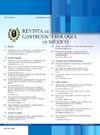墨西哥肠易激综合征患者的饮食特征。它与一般人群有什么不同吗?
IF 1.7
Q3 GASTROENTEROLOGY & HEPATOLOGY
引用次数: 0
摘要
肠易激综合征(IBS)是一种多因素疾病,其中饮食是症状的主要触发因素。许多患者在没有专业监督的情况下改变饮食,这可能导致营养风险或加重症状。本研究的目的是评估肠易激综合征患者与健康受试者的饮食摄入量。材料与方法对108名受试者进行了观察性、分析性、横断面研究:77名(71.3%)诊断为IBS (Rome IV标准),31名(28.7%)健康对照。患者年龄18 ~ 66岁,男女比例4.1:1。两组都完成了为期7天的饮食日记,记录了他们的日常饮食,然后使用营养软件程序进行分析。结果两组患者营养素摄取量相近,但IBS患者维生素D (P≤0.001)、维生素B1 (P≤0.001)、维生素B2 (P≤0.001)、维生素B3 (P≤0.001)的摄取量显著高于IBS患者。IBS亚型患者的维生素B3摄入量更高(P = 0.005)。在纤维摄入量上没有显著差异。结论墨西哥IBS患者的饮食与健康人略有不同。肠易激综合征患者消耗更多的纤维,他们的FODMAP摄入量与健康对照组相似。尽管大多数IBS患者符合宏量营养素和微量营养素摄入量的建议,但仍建议在IBS管理中进行营养指导,因为饮食调整可以显著改善症状。本文章由计算机程序翻译,如有差异,请以英文原文为准。
Características de la alimentación de los pacientes mexicanos con síndrome de intestino irritable. ¿Se distingue de la población general?
Introduction
Irritable bowel syndrome (IBS) is a multifactorial condition, in which diet is a main trigger of symptoms. Many patients modify their diet without professional supervision, which can cause nutritional risks or aggravate symptoms. The aim of this study was to evaluate the dietary intake of patients with IBS versus healthy subjects.
Material and methods
An observational, analytic, cross-sectional study was conducted on 108 subjects: 77 (71.3%) diagnosed with IBS (Rome IV criteria) and 31 (28.7%) healthy controls. Patient age was from 18 to 66 years and the woman-to-man ratio was 4.1:1. Both groups completed a 7-day food diary, registering their usual diet that was then analyzed using a nutrition software program.
Results
Macronutrient intake was similar between the two groups but the patients with IBS had a significantly higher intake of vitamins D (P≤.001), B1 (P≤.001), B2 (P≤.001), and B3 (P≤.001). There was greater vitamin B3 intake in patients with an IBS subtype (P =.005). There were no significant differences in fiber consumption.
Conclusion
The diet of Mexican patients with IBS was slightly different from that of healthy subjects. The IBS patients consumed more fiber and their FODMAP intake was similar to that of the healthy controls. Even though the majority of the IBS patients met the recommendations for macronutrient and micronutrient intake, nutritional guidance in the management of IBS is recommended because dietary adjustments can significantly improve symptoms.
求助全文
通过发布文献求助,成功后即可免费获取论文全文。
去求助
来源期刊

Revista de Gastroenterologia de Mexico
GASTROENTEROLOGY & HEPATOLOGY-
CiteScore
1.60
自引率
12.50%
发文量
102
审稿时长
12 weeks
期刊介绍:
La Revista de Gastroenterología de México es el órgano oficial de la Asociación Mexicana de Gastroenterología. Sus espacios están abiertos a los miembros de la Asociación como a todo miembro de la comunidad médica que manifieste interés por utilizar este foro para publicar sus trabajos, cumpliendo con las políticas editoriales que a continuación se mencionan. El objetivo principal de la Revista de Gastroenterología de México, es publicar trabajos originales del amplio campo de la gastroenterología, así como proporcionar información actualizada y relevante para el área de la especialidad y áreas afines. Los trabajos científicos incluyen las áreas de Gastroenterología clínica, endoscópica, quirúrgica y pediátrica.
 求助内容:
求助内容: 应助结果提醒方式:
应助结果提醒方式:


